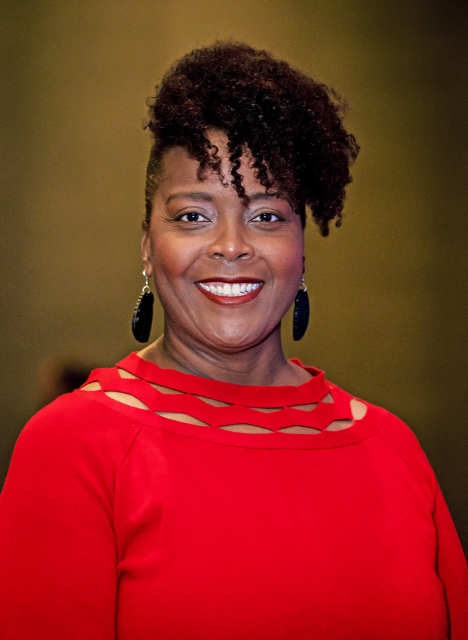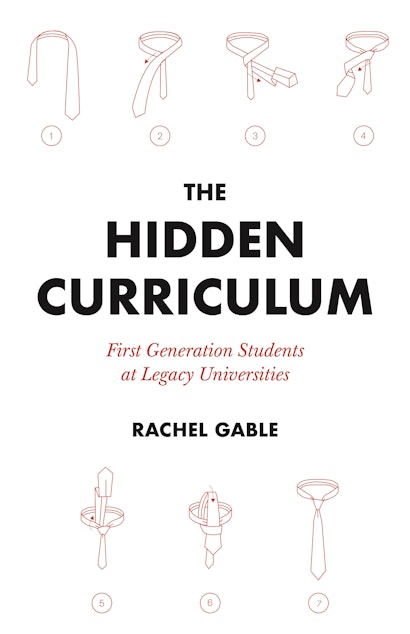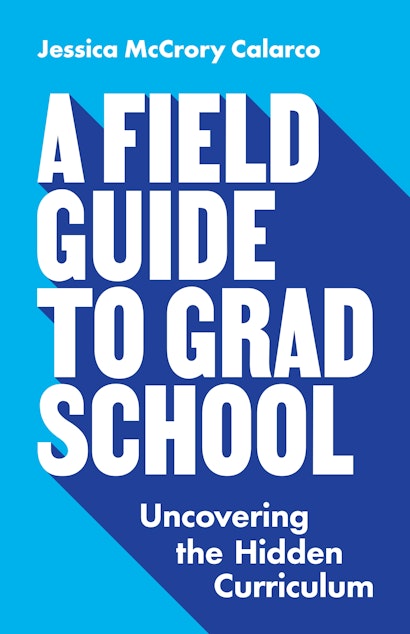There is a startling disparity in the number of female math PhDs and tenured professors, as evidenced by the most recent research from the American Mathematical Society showing the percentage of men vs. women who earned a PhD in Math and are tenured. Alvina Atkinson is a successful professor of mathematics, who as a first-generation student, navigated the college experience alone in an area underrepresented by minorities and women. Drawing from personal experience, she took the time to offer some advice on how to develop a college mindset, as well as how and where to find support on the journey. For more information on equity in education and navigating the graduate school experience, explore Princeton University Press titles Moving Up without Losing Your Way by Jennifer Morton, The Hidden Curriculum by Rachel Gable, and A Field Guide to Grad School by Jessica Calarco.
As a first-generation college student, where did you draw inspiration for attending college and how did you develop that college mindset?
AA: I remember the first time I heard the word college. I was in first grade and a teacher said to me, “Alvina, if anyone asks you if you are going to college, your answer should be yes.” That moment stands out in my mind because at the time, I did not know what college was, and I could not imagine someone ever approaching me and asking me if I was going to college. But surprisingly, the question did come up, and I do remember saying, “yes.”
What type of struggles did you face as a first-generation college student?
AA: My journey through college was not an easy one. As a first-generation college student, I did not have much support at home. I also had the responsibility of paying for my tuition, fees and books. I remember one semester having about $300 for books, but my book costs were well over $450. So, I decided that I would pick and choose which books I would purchase. To cut costs, I purchased the Chemistry lab book but not the textbook. My thinking was that the material that I was covering in the lab would also be covered in the class, and the lab book was almost $200 cheaper than the textbook. However, I could not prepare myself to do well on the quizzes and tests in that class. I reached out to my instructor and he explained that the quizzes and tests came straight from the textbook—the very textbook that I did not have. He then loaned me his and I went from a “D” average to making A’s on every test and quiz for the rest of the semester, including the final exam. So, my advice is that if there is a required resource, be it a textbook or online content, be sure to make the investment. It is required for a good reason!
As a female first-generation and underrepresented minority student pursuing math, did you ever feel discouraged? If so, what was the key to your perseverance?
AA: I actually did not know that math was an area that was underrepresented by minorities and women. While I enjoyed math, it did not necessarily come easy for me and I had to work hard to understand it. But I knew if I worked hard, then I could help my peers to understand it. I discovered early on that having my peers ask me questions gave me a better understanding of the material. Their questions would often bring up things that I had not considered. If I did not know the answer, I was always willing to seek counsel from my instructor. It was amazing how helping them helped me. When we help others, we often end up helping ourselves.
Do you have advice for students who are struggling in math?
AA: In the middle of my undergraduate work, I encountered a problem that I had never experienced before: I was struggling in a math class! As a person who loves math, I have no qualms asking the teacher for help or even asking my peers to form a study group. But in this particular class, nothing seemed to work.
I was doing so poorly in this class that I thought I may not be able to pass. At some point it occurred to me that, although this professor was the only one teaching the course this semester, there were other professors that taught this course before. I reached out to another professor who agreed to sit with me and review a test that I had previously failed. He was able to quickly identify a minor error that I made on a majority of the problems. He suggested that I go back to my professor and explain the minor error that I was making and to see if he could give me additional credit. I did this and the instructor awarded me half-credit on all of the problems where that error was made, improving my grade from 46% to 76%.
This experience taught me to always review your exams to see what you missed, especially the exams where you missed a lot. If you can review with your instructor, that is great. If not, there are other people you can speak with that are willing to help. Every error you make is a valuable learning opportunity.
As a first-generation student, you navigated the college experience alone. Do you have advice for where to find support along the journey?
AA: If you are presented with a roadblock, explain your situation to someone who has experience dealing with student issues. In my case it was the dean; in other cases, it could be your professor or your advisor. There are people in your school community who are uniquely equipped to help you overcome roadblocks that seem to you to be insurmountable.
In my junior year, I had completed a self-audit of my remaining credit requirements for earning my degree. I wanted to finish my degree within 3 semesters an in order to finish I needed 58 credits. That required 20 hours the first semester, 20 hours the second semester and 18 hours the third semester. That was going to be a tough road, but I was motivated to do it and I enrolled. What I did not realize is that there were additional fees for taking more than 18 hours in a semester. I was devastated because I did not have the money for the additional fees. I went to my dean and explained my situation. The dean was able to offer me a $500 scholarship which required me to volunteer in the tutoring lab for 5 hours per week. This amount more than covered the additional fees.
Having those discussions with a professor or dean requires confidence and courage. Do you recall a time when you were hesitant, but it was especially worthwhile?
AA: It was the end of my senior year, I was doing well in most of my classes and was on track for graduation. My final grades had already been turned in, but I ended up with a “B” in one of my programming classes. The problem was I had earned nearly a perfect score in this class prior to the final exam. So, I was curious about the grade that I had earned on the final exam that dropped my grade to a “B”. I decided to meet with the professor to inquire about what I missed on the final.
The professor looked at her grade book and noted that I made a 100 on the final. After investigating she realized that a “0” score on the final exam had been entered in error. She quickly filed the paperwork to change my grade to an “A”. I felt so proud of myself for being proactive in resolving that issue with my grade.
It so happened that there was another final grade from that same semester that was lower than expected. Motivated by my newfound confidence, I decided to meet with my writing professor to find out what caused my grade to drop. He also found a “0” score that was entered in error in his gradebook.
It was shocking that two professors entered a grade incorrectly and had I not asked the question, it would have gone un-corrected and the lower grades would have been a permanent part of my academic record. So, be sure that you double check your final grades and that you have the confidence to ask questions if things do not seem correct. You should also know how your final grades are calculated so that you later do not have any surprises.
Clearly just graduating college was not your only goal. Do you remember when you made the decision to pursue a Ph.D.?
AA: I was in 10th grade, and I was watching The Oprah Winfrey Show. She was consulting with a psychologist who had the title “Doctor.” I believe that was the first time I recognized the title being used for someone other than a medical doctor. I was intrigued. It was then that I decided that I wanted get a Ph.D. in math. If you asked me what I wanted to be growing up, I would have said, “a teacher.” I’ve wanted to be a teacher for as long as I can remember. There was something rewarding about helping others understand something that was foreign to them. In fourth grade I wanted to be a fourth-grade teacher because I noticed my peers struggling with fractions. In eighth grade, I wanted to teach algebra. But I ultimately thought that I would have the biggest impact if I taught at the college-level. It was decided, I would earn a Ph.D.
Dr. Atkinson, thank you for sharing your story and lessons. As high school seniors prepare for their college journey, what is the most important advice you wish to share?
AA: These are just a few important lessons that I have learned along my journey. They may seem simple to some, but when you are new to college, and you do not hear these stories from your parents or older siblings, your entire experience is brand new. You are really taking in the whole experience and those simple lessons can be overlooked. As I reflect over my experiences, the one unifying theme is that communication is key.
Communicating with peers can help with your overall learning processes. Whether you find what you are learning to be easy or difficult, talking with classmates is always a win-win. It is helpful to gain a different perspective and a better understanding of the big picture. Communicating with professors is important for learning content that may be more difficult and for making sure you fully understand assignments and opportunities to improve your grades. Communicating with administrators or advisors will be helpful to you when a problem arises, never be afraid to ask for help.
Your ability to communicate with others is a central part of the college experience. Learning how to navigate through challenges makes all the difference, and as a first-generation student, communication plays a vital role in your success.
Alvina Atkinson is a professor at Georgia Gwinnett College in Lawrenceville, Georgia. She is a native of New Orleans, Louisiana and she is a first-generation college graduate. She holds a Bachelor of Science degree in Mathematics from Dillard University in New Orleans, Louisiana, a Master of Arts degree in Mathematics from the University of Northern Iowa in Cedar Falls, Iowa, and a Ph.D. in Mathematics from Auburn University in Auburn, Alabama. She has taught mathematics courses at Auburn University-as a graduate student, and at Fort Valley State University-where she began her career as a fulltime faculty member. She has a passion for teaching students that enter college underprepared and she has worked on teams to develop co-requisite mathematics courses that support students while taking their college level courses. Her research interests include educational technology, interdisciplinary approaches to learning mathematics, and equity in higher education.



